
5 minute read
Risk factor: deforestation
Failure by JBS to map out its entire cattle supply chain, including indirect suppliers, exposes it to serious risk of trade from suppliers linked to deforestation, and the evidence laid out below shows that it does in fact trade with such suppliers. Its publicised role in transporting cattle between farms means it may even be facilitating the process of cattle laundering, a widespread problem in the Brazilian Amazon.
JBS’s cattle suppliers have been repeatedly linked to forest destruction – legal or otherwise – in violation of the 2009 G4 Cattle Agreement (see pages 20–21).
In 2017, following its Carne Fria (‘Cold Meat’) in investigation into over a dozen slaughterhouses in Pará, Tocantins and Bahia, Brazil’s environment agency IBAMA suspended two JBS plants and fined the company a total of R$24.7 million ($7.7 million) for buying cattle raised on embargoed land that had previously been illegally deforested and cleared by burning.69 According to Reuters, the agency also accused JBS of having ‘for years knowingly bought cattle that were raised on illegally deforested land’ in the Amazon state of Pará. IBAMA reported that JBS had bought 49,438 illegal cattle between 2013 and 2016, half of them directly from farms under embargo for illegal deforestation – a clear violation of the terms of its TAC and the G4 Cattle Agreement – and the remainder via ‘three-way “laundering” transactions to disguise the source’.70 (Such ‘triangulation’ – sourcing via an intermediary to conceal the origin of beef linked to environmental issues – appears to be common;71
see also pages 42–43.) IBAMA added that JBS was the purchaser of 84% of the animals its investigation had detected as coming from deforested lands.72 An audit by federal prosecutors found that 19% of the cattle JBS purchased in Pará in 2016 had ‘evidence of irregularities’.73
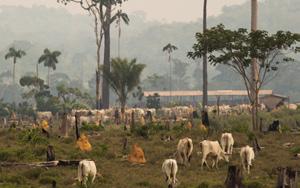
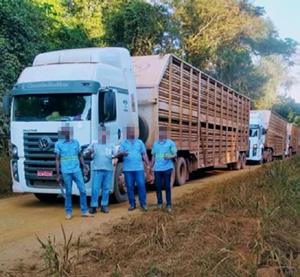
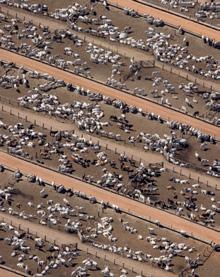
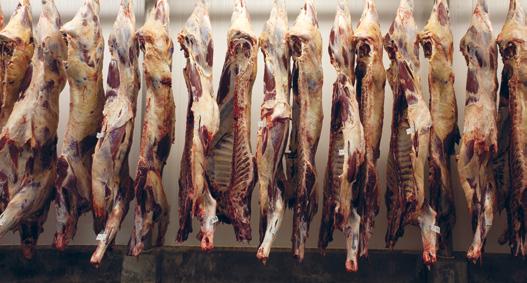
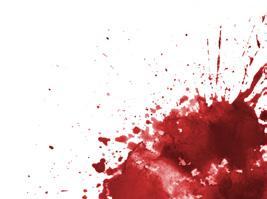
Opposite, from top left:
9 July 2020, Alta Floresta, Mato Grosso, Brazil, 11°50’19.9091” S 57°16’37.1755” W: Deforestation and fire monitoring in the Amazon. ©Christian Braga/Greenpeace
24 November 2015, Aripuanã, Mato Grosso, Brazil: Cattle in an embargoed area. ©Bruno Kelly/Greenpeace
July 2019: Screenshot of Facebook social media post shows JBSbranded livestock truck reportedly being used to collect cattle from a farm that has been embargoed.
8 August 2008, Fazenda Estancia Bahia, Mato Grosso, Brazil: Cattle farm. ©Greenpeace/ Daniel Beltrá
1 April 2009, Brazil: Slaughtered cattle hang in a Marfrig slaughterhouse facility. ©Ricardo Funari/ Lineair/Greenpeace buying cattle, against which IBAMA appealed.74
According to Amnesty International, although JBS claims that its appeal against the fines was upheld, IBAMA’s website shows that as of early July 2020 they remain active at different stages of the agency’s administrative procedure.75
In 2019, as the Amazon was being ravaged by fires set deliberately to clear land,76 investigations by the Bureau of Investigative Journalism revealed that JBS had purchased cattle directly from at least three farms that had had fires within their boundaries.77
Further investigations revealed that more than a quarter of a million fire alerts78 had been issued in areas from which JBS slaughterhouses are believed to buy cattle (far more than in the zones linked to competitors Minerva and Marfrig, with around 66,000 and 80,000 alerts respectively).79 Additional analysis of the 2019 fires confirmed that JBS had the highest risk exposure of any beef processor to fires inside its assumed buying zones.80
Early in 2020, a Greenpeace Brazil investigation81
revealed JBS’s exposure to cattle laundered from the Ricardo Franco State Park. According to the Greenpeace Brazil report, transport records show that between April 2018 and June 2019 Fazenda Barra Mansa – a farm registered to Marcos Antonio Assi Tozzati (a business partner and former advisor of ex-government chief of staff Eliseu Padilha) that is a significant supplier to JBS – received at least 4,000 head of cattle from two neighbouring farms inside the park: Fazenda Paredão I & II. One of these is registered under the name of Tozzatti and the other to companies apparently controlled by Padilha and Tozzatti. Satellite analysis by Greenpeace Brazil shows that between 1998 and 2019 thousands of hectares were deforested within the declared boundaries of the two farms; this is by definition illegal, given that they lie within the Ricardo Franco State Park, a Conservation Unit (protected area of high biodiversity value).82
According to the civil case filed by the Public Ministry of the State of Mato Grosso against Tozzatti in 2016, at least 2,097 ha were cleared illegally.83 According to the Greenpeace Brazil report, transport records indicate JBS facilities in Pontes e Lacerda received at least 6,000 cattle from Fazenda Barra Mansa between January 2018 and June 2019.84 According to shipping data based on export documents, between April 2018 and July 2019 the JBS meat processing facility in Pontes e Lacerda exported some 29,300 tonnes of beef products worth around $135 million. Approximately 15% of these exports went to EU countries, including Spain, the Netherlands, the UK, Germany, Italy, Greece and Portugal.85
A recent Greenpeace Brazil investigation reveals another farm sanctioned for illegal deforestation to which JBS is linked by a direct supplier under the same ownership: Fazenda Tiborna, owned by Antônio Lucena Barros. Better known as ‘Maranhense’, Barros has previously been accused of illegal extraction of mahogany in the Kayapó Indigenous lands, as reported by Greenpeace Brazil.86 According to the report findings based on mapping analysis, up until September 2019, the boundaries of Fazenda Tiborna overlapped with the Triunfo do Xingu Environmental Protection Area (APA) in Pará. In September 2019, following an embargo from IBAMA for deforestation and a R$3 million ($750,000) fine, Barros changed the property boundaries on the Rural Environmental Registry (CAR – see page 18), reducing the farm’s area from 58,000 ha to 7,000 ha. Some of the area within the old boundaries was reallocated to new farms with different named owners. This included the embargo area, which is now the responsibility of a separate farm with no known connection to Barros. Between August 2019 and June 2020 – ie predominantly after the boundary revision – an additional 5,369 ha of forest were cleared within the former property boundaries – the second-largest clearance in the Amazon in the period. The clearance is concentrated in an area where there is currently no CAR record. The Greenpeace Brazil investigation found that according to transport records, between January 2018 and February 2020, cattle were moved from Fazenda Tiborna to 29 different farms, including Fazenda Nuvem Branca II – also owned by Barros and a direct supplier of JBS.87










